SEO stands for ‘search engine optimization’. It is a series of techniques that will help your website to rank higher on search engine results pages.
Search engines are a huge source of traffic for websites, which makes SEO extremely important. By improving search traffic, you will be able to increase sales and conversions on your website.
However, SEO is a complex topic. We will share the most important SEO best practices and give you some useful checklists to help you work through what needs to be done on your website.
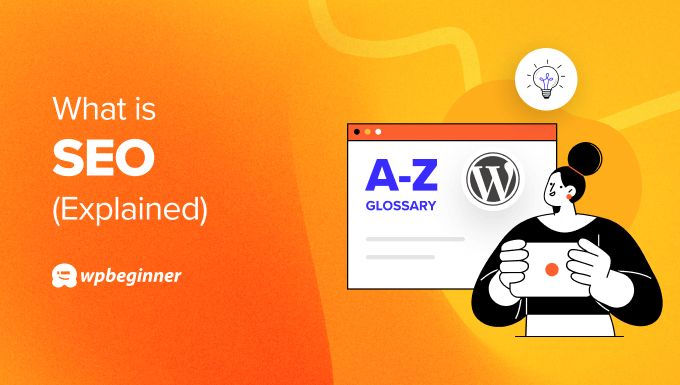
What Is SEO and Why Is It Important?
Search engine optimization (SEO) is about making strategic changes to your website and its content so that you are featured higher on search engine results pages (SERPs).
When people search the web for the topics you write about, SEO-optimized content will appear higher in the search results.
You can achieve this by creating a high-quality website with relevant and helpful information. You’ll also need to optimize the code and formatting to make it easier for search engines to find and understand your website content.
Search engine optimization is an ongoing process that touches on many areas of your website. You’ll find a detailed overview in our ultimate guide to WordPress SEO for Beginners.
We’ve also prepared practical checklists to help you optimize your site step-by-step:
- If you are new to SEO, then you can go through our WordPress SEO checklist for beginners.
- Advanced users can see our technical WordPress SEO framework (proven checklist).
With that being said, let’s take a look at what’s involved in optimizing a WordPress website for SEO. You can use the links below to jump to the topics you are most interested in:
- How Google's Algorithm and Guidelines Affect SEO
- How to Check If Your Website Is SEO Optimized
- The Best Plugins and Tools for SEO
- How to Optimize WordPress Site Settings for SEO
- How to Research and Use Keywords for SEO
- How to Optimize WordPress Content for SEO
- How to Optimize Your WooCommerce Store for SEO
- How to Use Schema Markup and Rich Snippets to Improve SEO
- How to Optimize WordPress Performance to Improve SEO
How Google’s Algorithm and Guidelines Affect SEO
Google and other search engines use advanced algorithms to understand the pages on your website and then rank them appropriately in search results. The goal of these algorithms is to place the web pages that will be most helpful to the user near the top of the search results.
However, the algorithms need your help to understand what your content is about. Otherwise, they won’t know how to rank it, and your website won’t appear on the search results pages.
Google and other search engines offer guidelines to help you create content that ranks well. They promote organic backlinks, relevant and unique content, and genuine discussions on the topic. They discourage spam links and posts, along with trying to game the system.
From time to time, these algorithms and guidelines are updated in an effort to improve the ranking system. For example, Google added E-E-A-T (Experience, Expertise, Authoritativeness, and Trustworthiness) to its guidelines and HCU (Helpful Content Update) to its ranking system.
These updates can make a significant impact on your SEO, so we recommend that you monitor Google algorithm updates.
How to Check If Your Website Is SEO Optimized
The first thing you should do is check to see if your WordPress website is SEO-optimized. By doing this, you will discover things you can improve to grow your search engine traffic.
We take you step-by-step into how to do this in our guide on how to check if your website is SEO optimized.
You may also find it helpful to analyze how your competitors’ websites are performing with SEO. You can learn what they are doing well and use those ideas on your own website.
You can learn how by following our guide on how to do an SEO competitor analysis in WordPress.
To check your website (and your competitors’), you’ll need to use some SEO tools. Let’s take a look at those now.
The Best Plugins and Tools for SEO
We are often asked about the best tools and plugins for SEO. The truth is, you don’t need to use many tools get higher search engine result rankings.
All in One SEO (AIOSEO) is the best WordPress SEO plugin on the market. Used by over 3+ million users, it is the most comprehensive SEO toolkit that helps you improve search rankings without learning any complicated SEO jargon.
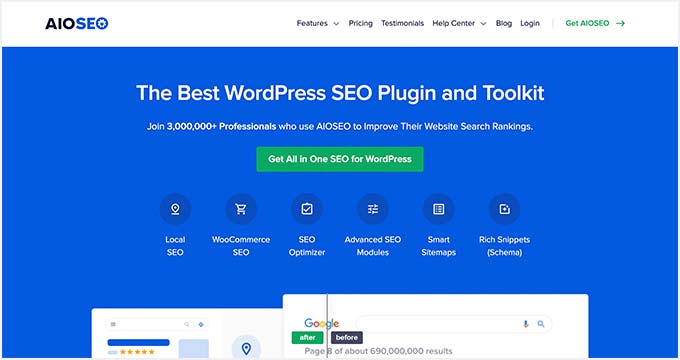
The free version of AIOSEO has all the essential features, but the pro version gives you everything you need to outrank your competitors.
You can also use AIOSEO to check if your website is SEO-optimized. We list some other tools in our expert comparison of SEO checker and website analyzer tools.
Finally, you might be interested to learn that there is a growing number of excellent AI SEO tools that you can use to optimize your website. These powerful programs are trained with a massive amount of data to make SEO a breeze.
How to Optimize WordPress Site Settings for SEO
But first, let’s make sure that your WordPress settings are right. This is important because the wrong settings can undermine everything else you do to optimize your site for SEO.
The right settings will make your site visible to search engines and help them better understand your content so it is ranked correctly. They will also make sure that Google doesn’t penalize your website for using bad practices.
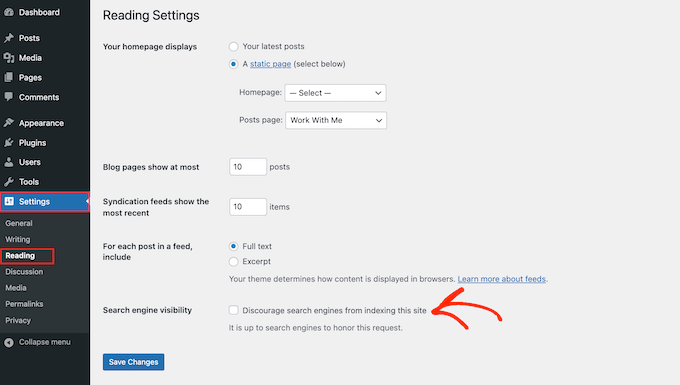
To get started, simply work step-by-step through our guide on WordPress site settings that are critical for SEO success.
How to Research and Use Keywords for SEO
Don’t fall into the trap of assuming you already know what your audience is searching for. When planning content for your blog or website, you should research the topics relevant to your niche that are actually needed and being searched for.
Keyword research helps you find the words that people search for when looking for content like yours. You can then write blog posts about the right topics and use these keywords in your posts to get more traffic from search engines such as Google.
There are a number of keyword research tools that you can use for SEO. Some of our top picks include Semrush and LowFruits.
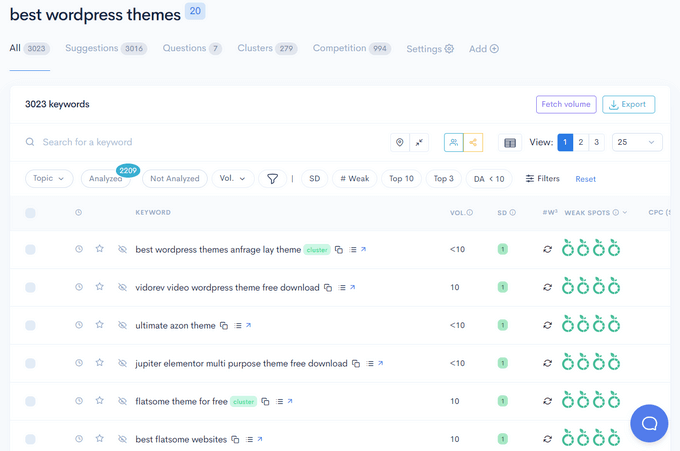
We show you how to use them to discover what users are searching for in our guide on how to do keyword research for your WordPress blog.
This guide also covers how to apply your keyword research in your business or blog, as well as how to track the performance of your keyword research.
Keyword research can also help you identify important topics that your existing content doesn’t cover. You can uncover them by performing a content gap analysis, and this will give you an ongoing source of content ideas to write about.
How to Optimize WordPress Content for SEO
Optimizing your content is one of the best ways of improving your SEO.
As you write each article, you should choose a keyword to focus on. This will be the search phrase that your users are most likely to use to search for your article. You can also choose additional semantic keywords related to your focus keyword.
If you are using All in One SEO, then you can set the focus keyword in your article’s SEO settings. The plugin will then give you a score so you can see how effectively you have used it in your article.

You will also need to write an engaging title that readers will want to click on and add a meta description to help Google better understand the post.
Adding images and videos to your posts will make them more engaging, which also helps SEO. You can see our beginner’s guide on how to optimize images for search engines.
You can also boost the SEO of your other posts by linking to them. We recommend that you make internal linking a habit.

Finally, you can use categories and tags to organize your posts so it is easier for visitors and search engines to find your content.
As you can see, there are a lot of things you can do to make your content search engine-friendly. You’ll find these and many other actionable tips in our checklist on how to optimize your blog posts for SEO like a pro.
How to Optimize Your WooCommerce Store for SEO
SEO is just as important when you have an online store. It’s almost like having Google and other search engines advertise your products for you.
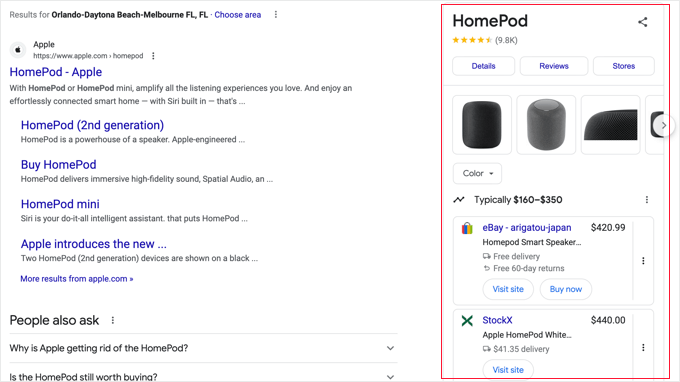
There’s a lot involved in WooCommerce SEO, and it’s an ongoing process. That’s why we put together WooCommerce SEO Made Easy, a step-by-step guide to ranking #1 on Google.
This guide goes over important SEO tips for your online store and makes them easy to understand.
How to Use Schema Markup and Rich Snippets to Improve SEO
You can also improve your site SEO by adding schema markup to your website using a tool like AIOSEO. This is a special type of HTML code that provides search engines with more information about your website, content, and products.
They can use this information to enhance your listing in the search results, such as a featured snippet or knowledge panel.
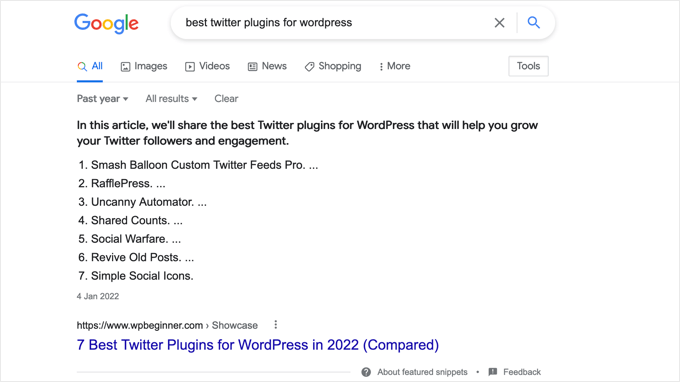
Enhanced search listings can bring you more traffic by standing out on SERPs, or by adding your store to local search results and in Google Maps.
Schema can tell search engines that a particular page is a blog post, a recipe, an FAQ, a news article, or a product page in your online store. This data can be used to display rich results.
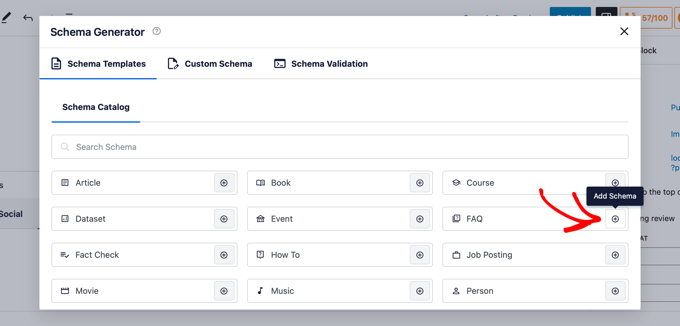
We have created a number of guides on adding different types of schema markup:
- How to Add FAQ Schema in WordPress
- How to Properly Add SEO-Friendly ‘How to’ Schema in WordPress
- How to Add SEO-Friendly Recipe Schema in WordPress (Easy Way)
- How to Add Multiple Locations Schema for Local Business in WordPress
How to Optimize WordPress Performance to Improve SEO
Search engines like Google prioritize faster websites in their results. That means that optimizing the performance of your WordPress website will improve SEO.
Even if you follow the steps above to optimize your site for SEO, your search engine rankings will take a big hit if your loading time is slow.
You can make sure your web pages load quickly by following our ultimate guide on WordPress speed and performance.
We hope this article helped you learn more about SEO in WordPress. You may also want to see our Additional Reading list below for related articles on useful WordPress tips, tricks, and ideas.
If you liked this article, then please subscribe to our YouTube Channel for WordPress video tutorials. You can also find us on Twitter and Facebook.
Additional Reading
- 7 Best SEO Checker and Website Analyzer Tools Compared (2024)
- 15 Best WordPress SEO Plugins and Tools That You Should Use
- How to Do a SEO Content Gap Analysis (Beginner’s Guide)
- 13-Point WordPress SEO Checklist for Beginners
- Ultimate WordPress SEO Guide for Beginners (Step by Step)
- How to Do Keyword Research for Your WordPress Blog
- 13 WordPress Site Settings That Are Critical for SEO Success
- How to Add Schema Markup in WordPress and WooCommerce
- 8 Best Keyword Research Tools for SEO in 2024 (Compared)
- 11 Tips to Optimize Your Blog Posts for SEO Like a Pro (Checklist)




